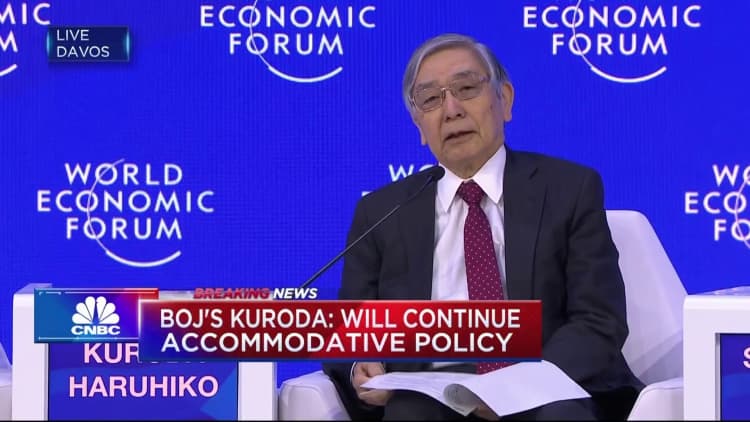Bank of Japan defends yield curve control measures, intends to stick to ultra-easy monetary policy

Bank of Japan Governor Haruhiko Kuroda on Friday defended the central bank’s decision to widen the trading band in its yield curve control program and committed to continuing the BOJ’s “extremely accommodative” expansionary monetary policy.
Speaking during a panel session at the World Economic Forum in Davos, Switzerland, Kuroda said it was “not wrong” for the BOJ’s board to widen its tolerance range for the yield on its 10-year government bond from 25 basis points to 50 basis points last month.
Since the move, 10-year JGB benchmark yields have exceeded the upper ceiling several times.
His comments at Davos come shortly after the central bank defied market expectations by sticking to a core tenet of its ultra-loose monetary policy.
The BOJ on Wednesday opted to keep its ultra-dovish -0.1% interest rate unchanged and maintained its yield curve tolerance band. The decision prompted the Japanese yen to fall against the U.S. dollar and followed weeks of bond market turmoil during which yields jumped.
It leaves the BOJ at odds with other major central banks, which have hiked interest rates in a bid to tackle rising inflationary pressure.
Japan’s inflation rate jumped to a fresh 41-year high in December. The rate is still relatively low when compared to some other countries. Nonetheless, the world’s third-largest economy reported core consumer prices rose to 4% on an annualized basis in the final month of last year, double the central bank’s target of 2%.
Morning commuters in front of the Bank of Japan headquarters in Tokyo, Japan, on Jan. 16, 2023.
Bloomberg | Bloomberg | Getty Images
“We expect, probably from February this year, inflation rates start to decline and [in] fiscal year 2023 as a whole, [the] inflation rate will be less than 2%. So, we decided to maintain the current extremely accommodative monetary policy for the time being,” Kuroda said, largely attributing rising inflation to an import price hike.
“Our hope is that wages start to rise and that could make [the] 2% inflation target to be met in a stable and sustainable manner, but we have to wait for some time,” he added.
Kuroda’s one regret
Alongside bond market turmoil, rising inflation is likely to amplify pressure on Kuroda, who is slated to retire in early April, to end the central bank’s ultra-loose monetary policy.
Asked whether he had any regrets during his almost decade-long reign, Kuroda replied, “I think in the last nearly 10 years during which I have been governor of the Bank of Japan we tried to eradicate deflation and that certainly we have been successful in eradicating … And we tried to recover economic growth.”
“All in all, I think the government’s policy coupled with the Bank of Japan’s extremely accommodative monetary policy has been successful in changing the Japanese economic structure and growth prospect, but unfortunately 2% inflation target has not been achieved in a sustainable and stable manner,” Kuroda said.
“So that is the only regret I have,” he added.
— CNBC’s Jihye Lee contributed to this report.
For all the latest World News Click Here
For the latest news and updates, follow us on Google News.

